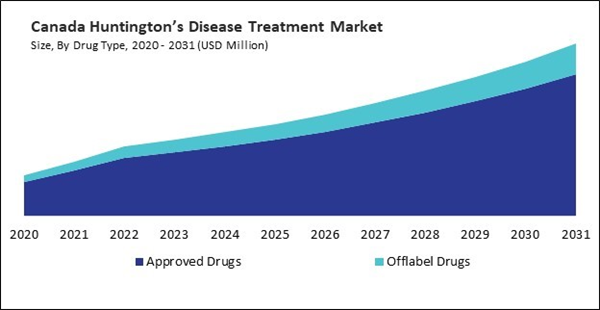The US market dominated the North America Huntington's Disease Treatment Market by Country in 2023, and is forecast to continue being a dominant market till 2031; thereby, achieving a market value of $234.80 millions by 2031. The Canada market is experiencing a CAGR of 10.9% during (2024 - 2031). Additionally, The Mexico market would exhibit a CAGR of 9.9% during (2024 - 2031).
Symptomatic management aims to alleviate the motor, cognitive, and psychiatric symptoms associated with Huntington’s Disease, thereby improving patients’ quality of life. Key therapies include chorea, which is characterized by involuntary movements and is often treated with medications such as tetrabenazine and deutetrabenazine. These drugs help reduce dopamine levels in the brain, mitigating chorea symptoms.
In addition, muscle rigidity and dystonia, which can cause discomfort and impair movement, may be managed with muscle relaxants and physical therapy. HD patients commonly experience psychiatric disturbances like depression, anxiety, and irritability. Antidepressants, anxiolytics, and antipsychotic medications are prescribed to manage these symptoms. While specific medications for cognitive decline in HD are limited, cognitive rehabilitation, memory aids, and supportive therapies play a crucial role in managing cognitive impairments.
Rare diseases often present diagnostic challenges due to their unfamiliarity among healthcare providers. The burden of these disorders on patients and their families may increase because of delays in diagnosis and necessary treatment. The Canadian government reports that of the more than 7,000 identified rare diseases, 14,000 children under the age of 15 in Canada pass away from a rare disease annually. Furthermore, increased funding can lead to establishing or expanding research facilities and laboratories specializing in neurodegenerative diseases like HD. This infrastructure supports advanced research methodologies and recruiting specialized researchers and clinicians. Canada's first National Strategy for Drugs for Rare Diseases, unveiled in March 2023, aims to increase the availability and cost-effectiveness of drugs for rare diseases. In addition, higher healthcare expenditure in Mexico facilitates greater accessibility to specialized neurology services, including diagnostic facilities, neurological consultations, and multidisciplinary care teams equipped to manage complex conditions like Huntington's Disease. Thus, the high prevalence of rare diseases and rising healthcare expenditure in the region is driving the growth of the market.
List of Key Companies Profiled
- Bausch Health Companies, Inc.
- Teva Pharmaceutical Industries Ltd.
- Camber Pharmaceuticals, Inc. (Hetero Labs Limited)
- Hikma Pharmaceuticals PLC
- Takeda Pharmaceutical Company Limited
- Sun Pharmaceutical Industries Ltd.
- Dr.Reddy’s Laboratories Ltd.
- Neurocrine Biosciences Inc.
- Pfizer, Inc.
- F.Hoffmann-La Roche Ltd.
Market Report Segmentation
By Drug Type- Approved Drugs
- Tetrabenazine
- Deutetrabenazine
- Offlabel Drugs
- Hospital Pharmacies
- Drug Store & Retail Pharmacies
- Online Pharmacies
- Below 50 years
- Above 50 years
- US
- Canada
- Mexico
- Rest of North America
Table of Contents
Companies Mentioned
- Bausch Health Companies, Inc.
- Teva Pharmaceutical Industries Ltd.
- Camber Pharmaceuticals, Inc. (Hetero Labs Limited)
- Hikma Pharmaceuticals PLC
- Takeda Pharmaceutical Company Limited
- Sun Pharmaceutical Industries Ltd.
- Dr. Reddy’s Laboratories Ltd.
- Neurocrine Biosciences Inc.
- Pfizer, Inc.
- F. Hoffmann-La Roche Ltd.









